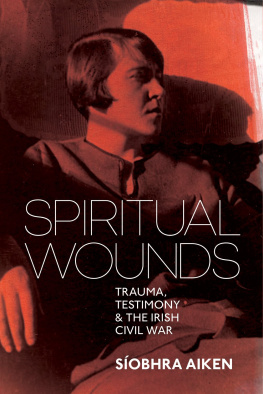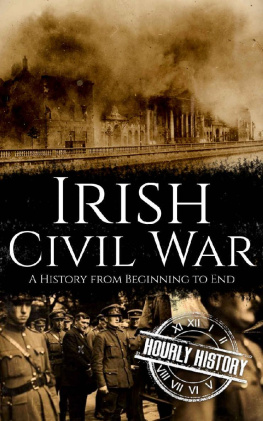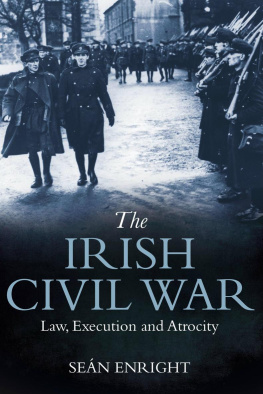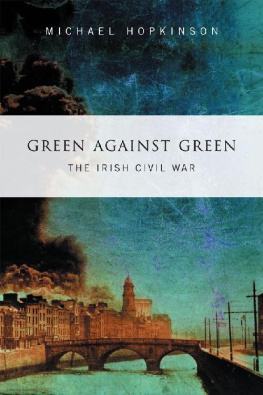
SPIRITUAL WOUNDS
SPIRITUAL WOUNDS
TRAUMA, TESTIMONY AND THE IRISH CIVIL WAR
SOBHRA AIKEN

First published in 2022 by
Irish Academic Press
10 Georges Street
Newbridge
Co. Kildare
Ireland
www.iap.ie
Sobhra Aiken, 2022
978 1 78855 166 3 (Cloth)
978 1 78855 167 0 (Epub)
978 1 78855 168 7 (PDF)
A CIP catalogue record for this book is available from the British Library.
All rights reserved. No part of this publication may be reproduced, stored in a retrieval system, or transmitted, in any form or by any means (electronic, mechanical, photocopying, recording or otherwise), without the prior written permission of both the copyright owner and the publisher of this book.
Typeset in Minion Pro 11/15 pt
Cover design by Fiachra McCarthy
Cover image: Catalina Bulfin MacBride, courtesy of Kilmainham Gaol Museum and the White family.
Irish Academic Press is a member of Publishing Ireland.
i ndilchuimhne ar na mn misnila a chuaigh romham,
a chuir solta na rabhlide
ach nr thug leo an fmhar
Nano Aiken (18961972)
Nellie Stuart (18981985)
Maudie Davin (18981978)
Annie Cardwell (19041922)
CONTENTS
Introduction
The Unspeakable Irish Civil War?
T he
This book is concerned with how the overemphasis on the reticence surrounding the Irish Civil War has occluded the many voices that broke the silence. I started off by compiling a list of writings by civil war veterans produced in the decades immediately after the conflict. Over time, the list expanded into a catalogue of accounts and books, many of which were published before there was any talk of setting up the Bureau of Military History in 1947. This book reintroduces some of these testimonies into public debate and, in doing so, opens up an alternative archive of veteran testimony from the Irish Civil War. The testimonies discussed in the pages that follow were written by pro- and anti-treaty men and women, in both English and Irish. They appear in many guises but share one major characteristic: nearly all have been overlooked in historical enquiry to date. The wealth of this body of testimony suggests that the silence of the Irish Civil War was not necessarily a result of revolutionaries reluctance to speak, but rather due to the unwillingness of the architects of official memory journalists, historians, politicians to listen to the testimony of civil war veterans.
The code of silence around the Irish Civil War is indicative of the widespread belief that particularly devastating events are followed by an extended period of silence and repression of memory. These perceived silences, as Guy Beiner explains, reflect the popular appeal of quasi-psychoanalytical models in which a traumatic event is considered, by definition, to be unspeakable until it resurfaces at a much later date.
However, studies of civil wars internationally suggest that these calls to forget often paradoxically produce a commitment to remember. Indeed, civil wars, more so perhaps than other conflicts, often produce an abundance of narrative as [a]midst enforced collective amnesia, public censorship and the maddening proliferation of competing versions, the task of fashioning historical narratives becomes all the [more] urgent as it is contentious.
Moreover, The strength of this often unexplainable desire to tell is borne out in almost every page of this book.
Testimonies of contentious events seldom appear in conventional form, however. The act of introducing private, often painful, experience into the public realm, especially when it challenged official memory-making (and especially forgetting), demanded the cautious deployment of self-protective narrative strategies. As a result, civil war testimony is often found in places where historians do not traditionally look: in accounts and stories that blur narrative genres, in seemingly artless fictionalised life writing, in autobiographically based fiction and drama, buried under the artifice of poetry, or hidden in Gothic and romance modes. The supposed dearth of published first-hand testimonies relating to the civil war is especially complicated by the proliferation of popular autobiographical novels, particularly in the 1920s and 1930s.
The Irish Civil War When Did It Become Traumatic?
For all the emphasis on silence, veterans were not shy about expressing their view that the civil war was particularly distressing: Sghle Humphreys lamented that there was nothing chomh holc le Cogadh na gCarad [as bad as civil war]; for Mary Harpur, it was the tragedy of all tragedies; Frank OConnor wrote that the period from the end of 1922 to the spring of 1923 was one that I found almost unbearably painful.
In the strictest of historical terms, Irelands civil war erupted over the acceptance of the Anglo-Irish Treaty in December 1921 and was fought from 28 June 1922 to 30 April 1923 between the Provisional Governments pro-treaty forces and the anti-treaty Irish Republican Army (IRA), who objected to the oath of allegiance to the British monarch and to partition. The brevity of the conflict was very much at odds with the lingering after-effects felt by many veterans. Families, friends, former comrades and even spouses found themselves split over the terms of the treaty. Others attempted to prevent the conflict
Despite the currency of the terms post-war bitterness, collective silence and traumatic civil war in both popular and academic discourse,
The relative neglect of the traumatic legacy popularly associated with the civil war can be attributed to the scepticism towards popular mythology long associated with the scientific approach in modern Irish historiography.
This emphasis on levels of violence fails, however, to consider an event and the traumatic meaning it accrues as separate. Leading trauma theorist Cathy Caruth has famously argued that trauma is not locatable in the simple violent or original event in an individuals past; trauma is rather a process of remembering, as the unassimilated event returns to haunt the survivor later on.
In the context of the Irish Civil War, diaries, letters and newspaper reports written at the time all suggest that the conflict was instantaneously coded as particularly traumatic, including by those with little or no direct interaction with its violence.
If the civil war was imagined as uniquely devastating before it even occurred, the traumatic memory of the Irish Civil War cannot be confined to the official chronology spanning from 28 June 1922 to the ceasefire order of 30 April 1923. Dublin volunteer Pdraig OHoran highlights in his remarkable fictionalised testimony, The Flame of Youth (see Chapter Four), that the shock of the civil war was not viewed as a single, isolated traumatic episode. Rather the bombardment of the anti-treaty headquarters at Dublins Four Courts in June 1922 was recalled through the lens of the violence and devastation that had preceded it: FranceFranceFrance, and Easter Week in Dublin. And now this (my emphasis).
While OHoran viewed the civil war as the culmination of a series of traumatic events which included the First World War, 1916 Rising and independence struggle, the carefully curated and glorified memory of the Rising and the war of independence also led to the overshadowing of various episodes that did not adhere to the heroic template. Indeed, the unspeakable civil war was immediately characterised by its contrast to the Rising and the four glorious years of 191821.
Next page







